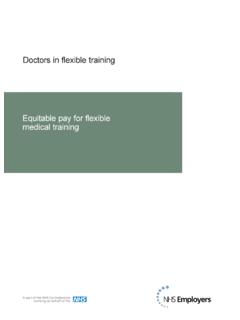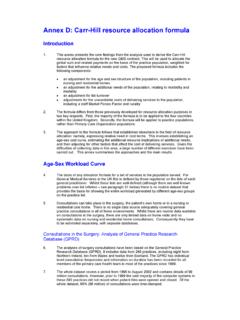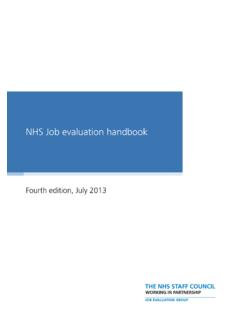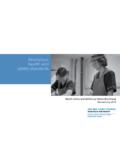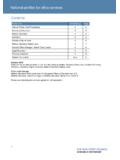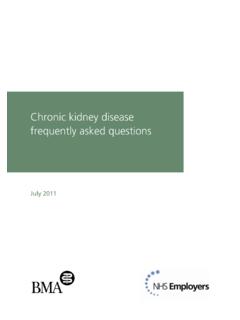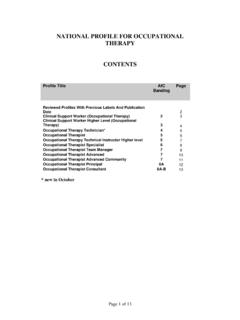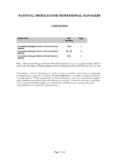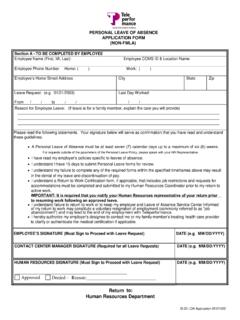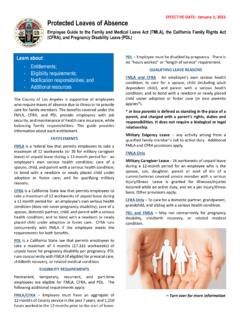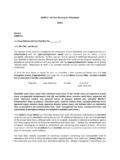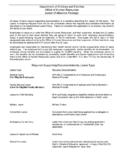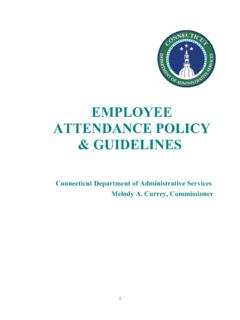Transcription of Management of long-term COVID-19 sickness absences
1 Management of long-term COVID-19 sickness absences Introduction As part of the emergency response to the current COVID-19 pandemic, the Department of Health and Social Care (DHSC) introduced temporary workforce guidance as part of its strategy to support workforce leaders and NHS staff to respond to the pandemic. The guidance aimed to support infection control measures and the health, safety, and wellbeing of NHS staff. As part of this, the DHSC produced some supporting guidance which introduced a temporary enhanced provision of COVID-19 sick pay'. The guidance sets out the following approach during the pandemic: The pausing of normal sickness provisions (Section 14, England) in the NHS. terms and conditions of service handbook for staff covered by these provisions, for the duration of the pandemic for COVID-19 related sickness absence . All staff who are off sick with COVID-19 to be paid full pay as if at work via the use of the temporary COVID-19 sick pay provisions.
2 A separate recording system for any COVID-19 related sickness absence . The disregarding of any sickness absence related to COVID-19 for the purposes of sickness absence triggers or sickness Management policies. The DHSC workforce guidance can be found on the NHS Employers website along with supporting FAQs. The NHS Staff Council has produced the following guidance to help employers and trade union representatives with supporting staff during the Management of long-term COVID-19 sickness absences . Long term COVID-19 related sickness absence Researchi suggests that most people can expect to recover from COVID-19 within 2-3. weeks with data suggesting that around 10 per cent of people suffer symptoms for more than three weeks. DHSC analysis of unpublished Management information data, extracted from the NHS Electronic Staff Record HR and Payroll system, indicates that the average duration of disease amongst NHS staff is similar to that seen elsewhere.
3 1. Estimates suggest that around 93 per cent of absences related to COVID-19 sickness lasted for less than 30 days and over 99 per cent lasted for less than three months. We are aware, however, that for a small number of staff this has lasted for a longer period. These include: Staff who have become seriously ill through COVID-19 and suffer long-term absence with the need for extended recovery and rehabilitation. Staff who have experienced lingering symptoms after a COVID-19 infection resulting in continuous or intermittent absences related to their original episode . what is commonly known as Long Covid. For many individuals, Long Covid presents as relapses of a range of symptoms whilst others struggle with a single symptomii. At this early stage, the long-term impacts of COVID-19 are not fully understood; particularly for cases of severe COVID-19 illness. Further research is required to better understand the impacts and treatment options.
4 Purpose of this guidance Employing organisations are encouraged to adapt the principles of their local sickness Management policy in order to manage long term COVID-19 absences and to provide the necessary support to staff to aid their recovery and rehabilitation. The advice of occupational health experts will help support conversations between individuals and their line managers in assisting a safe and smooth return to the workplace. This should include consideration of any recommended reasonable adjustmentsiii. Each case will need to be managed in a supportive and sensitive manner in recognition that the DHSC guidance on the disregarding of standard triggers/processes means here is no one size fits all' approach. A bespoke' or individually tailored approach should apply to the Management of Long Covid and other longer Covid-related absences . Key principles The following principles have been developed to support employers in managing longer term Covid-related sickness absences .
5 Where individuals wish to have the support of their trade union representative, this will need to be facilitated, including through early and sensitive conversations with the individual concerned. Risk assessments: ensuring individual risk assessmentsiv are undertaken and regularly reviewed. 2. Occupational health: securing occupational health advice is central to the Management of individual cases and should be sought as early as is reasonably practical. Their advice will guide conversations between the individual and the employing organisation and help to manage expectations in relation to what is and is not possible. Phased return to work: should support individuals to work towards fulfilling all their duties and responsibilities. A flexible approach may be required, specifically to extending a phased returnv period for longer than a standard policy allows. This can include the exploration of modified shifts, reduced and flexible hours.
6 When supporting a phased return, the NHS terms and conditions of service handbook (Annex 26) makes provisions for staff to receive their normal pay. Reduced or amended duties: explore whether the individual's existing duties could be reduced or amended (temporarily or permanently, taking into account the needs and wishes of the individual) to facilitate a return to work. Conversations to explore how duties may be adapted to enable individuals to work from home for a specified period may be required. Temporary changes should be reviewed intermittently and to consider a return to normal duties. Redeployment: to support the retention of staff, redeployment on a temporary or permanent basis, may need to be considered, taking into consideration the needs and wishes of the individual. This should be explored as an alternative to ill health retirement. Rehabilitation: identifying appropriate treatments and interventions to support staff return to work at the earliest opportunity.
7 In relation to Long Covid this includes the option to refer individuals to rehabilitationvi and Long Covid clinicsvii to support the Management of their symptoms, both physical and psychological. Equality Impact Assessments: As defined by the Equality Act 2010, an individual has a disability if they have a physical or mental impairment which has a substantial and long-term detrimental impact on their ability to carry out normal day to day activitiesviii. Consequently, Long Covid may be considered as a disability under the terms of the Equality Actix. Ill health retirement: For those in the NHS Pension Scheme, provisions exist within the scheme which can be used as a mechanism to support individuals who, despite best efforts of both parties, are not able to return to work due to permanent ill health. Where conversations of this nature take place, the involvement of the individuals trade unions representative, where requested, should be facilitated.
8 Full details about the benefits of the NHS Pension schemex should be made available to 3. individuals to ensure they have all the necessary information to make an informed decision. Applications can be made before a decision to leave employment is made and may help the individual in their decision making. Further information is available at the following links: Faculty of Occupational Medicinexi Society of Occupational Medicine: COVID-19 return to work guidancexii National Institute of Clinical Excellence: COVID-19 guidancexiii NHS Staff Council Executive June 2021. i How long does Covid last? ii Living with Covid second review iii NHS Employers Reasonable adjustments in the workplace experience/diversity-and-inclusion/polic y-and-guidance/disability/reasonable-adj ustments-in-the-workplace iv NHS Employers Risk Assessments for staff wellbeing/supporting-staff-health-and-sa fety/risk-assessments-for-staff v NHS Staff Council COVID-19 sickness absence Management FAQs /media/Employers/Documents/COVID19/NHS-S taff-Council- sickness - Management - vi NHS Employers Rapid access to treatment and rehabilitation for NHS staff - /media/Employers/Publications/Health-and - vii NHS England Long Covid clinics more-than-60-clinics/.
9 Viii ix NHS Employers Disability inclusion/policy-and-guidance/disability x NHS Business Services Authority - xi Faculty of Occupational Medicine - xii Society of Occupational Medicine COVID-19 return to work guidance xiii COVID-19 rapid guideline: managing the long-term effects of COVID-19 - 4.
